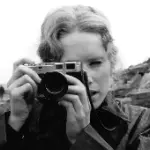
Martin McDonagh is only one step away from an internationally renowned director.
Many people don't know him well. It's no surprise that, before Three Billboards, McDonagh had only one short and two feature films.
He has just started on the road as a film director but has rich experience in theatre.
He is a world-renowned drama writer and a representative figure in the contemporary British drama world, who has won various awards.
Since he set foot in the film industry, his development has been smooth. The first directed short film won the Oscar that year, and the two subsequent works were all good.
|From Theater to Cinema
McDonagh was born in London to parents from rural Ireland. When he was 16, his parents returned to Ireland, but he and his younger brother stayed in London, living on unemployment benefits.

▲John McDonagh (left) and Martin McDonagh (right)
His early life allowed him to see the warmth and coldness of the world. Whether in McDonagh's plays or movies, "dark comedy" is his feature.
McDonagh is fascinated by the customs and customs of his hometown in Ireland.
Several of his early plays were set in his hometown and included many Irish profanities as a symbol of the raw nature of humanity. It complements his dark comedy.
Despite his fame in the theater, McDonagh's dream was to make movies.
He once said he went to the theater because his script did not sell. In 2004, he launched his first short film "Six Shooters" which won the Oscar for Best Short Film in one fell swoop.
When the doors of film companies opened to him, he was not in a rush and still released one film in four years.
When asked why it took so long, he said with theaters around, I am not afraid of starving. Well, it is a good reason.
McDonagh has an unconventional nature, but his screenplays are known for their ingenuity. His feature debut, "In Bruges" earned him another Oscar nomination and a Golden Globe for Colin Farrell.

The subsequent work "Seven Psychopaths" and "Three Billboards Outside Ebbing, Missouri " were well received, too.

From theater to cinema, his creative skills have matured day by day. The ingenuity of the script stems from the experience of his drama.
|From drama to film
McDonagh is very good at catching people's attention with a theatrical opening.
The difference between film and stage is that it is easier for movies to express a sense of interlaced time and space. The most typical example is what we call "montage".
In "Seven Psychopaths," McDonagh slickly directs an imaginary "Grave Rush." Since the main line of the story is the script conceived by the protagonist, not only time and space but also the boundaries between virtual and real are broken.
Due to his work experience in the theater, McDonagh often suddenly arranges a paragraph of fragments for the character.
In "In Bruges", the characters often have to suddenly praise the ancient city of Bruges in Belgium as the background. The plots don't affect the killing career of the killers, but it's funny to see them suddenly come to a freestyle.
On the other hand, these seemingly meaningless lines are the most intuitive expression of the word "absurd". In the final analysis, "dark comedy" is an extension of the theater of the absurd.
Another example is the chattering young man met by the widowed hero on the train in "Six Shooter". He not only chattered but also looked for a fight. why? No reason.

The absurdity of discourse and the absurdity of behavior, summed up, is the absurdity of life.
|From comedy to tragedy
Whether McDonagh's plays or film works, "dark comedy" is their feature.
Since they are"dark comedies", McDonagh's film is naturally humorous. The "dark" part of McDonagh's comedy is often reflected in the fate of the characters.
In McDonagh's script, everyone is an aggregation of contradictions.

The killer boss (played by Ralph Fiennes) in "In Bruges" is very sentimental. Although he was a super cold-blooded killer, he set the principle of "not killing women and children", so he went to chase and kill the male protagonist who accidentally killed a child.
The killer boss is strict with others and also with himself. If the lady boss of the restaurant doesn't let him have a shootout there, he won't.
The professional "killers" no longer look like ruthless murderers, but more like a group of unlucky ones.

The shadow of death has always hung over McDonagh's film work. Under the comic tone, death is downplayed and even becomes part of the comedy.
A light treatment of life is where "Black Comedy" comes from.
|What is Absurdist Theater?
In the Absurdist Theater, everything is empty and meaningless. To be alive is the greatest mental torture.
McDonagh absorbed the absurdist's love for death plots and processed them to be more dramatic for watching. Kill or be killed, the characters in the drama cannot decide their fate. However, they are often played tricks by fate.
At the end of "Six Shooter", the protagonist wanted to die with his rabbit to accompany his dead wife. He stole a pistol with only two bullets left from the young man on the train.

A ridiculous thing happened. The rabbit was headshot and then the gun went off. He couldn't die. And he lost his only pet. The God he least trusted played a joke on him.
These plots are very humorous, but it makes people unable to laugh. On the contrary, it gives birth to an indescribable sense of pathos, which is depression.
If the works of Oscar Wilde are "Looking up at the starry sky even in the gutter", then the ones of McDonagh are declaring there is no difference between the gutter and starry sky.
The core of comedy is a tragedy. McDonagh has been interpreting it with his works.








Share your thoughts!
Be the first to start the conversation.